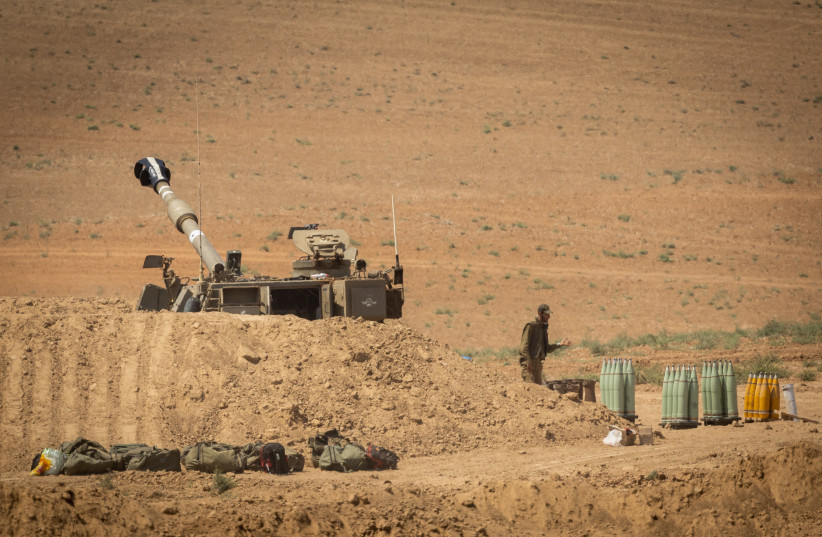Israel’s decision to go out to a military operation in the Gaza strip was inevitable, due to Islamic Jihad’s (PIJ) attempt to paralyze areas in the south of the country for several days. Despite the efforts of indirect mediation with Hamas and the PIJ, through Qatar and Egypt, the PIJ refused to back down from its threats to attack Israeli targets (after the arrest of the head of the PIJ in Judea and Samaria, Bassam al-Saadi, by IDF forces in Jenin), and even raised unrealistic demands, such as the cessation of the IDF’s activities against the organization in Judea and Samaria, in order to bring calm.
What were Israel's goals in its Gaza operation?
The purpose of the current military operation was to thwart the violent activity of the PIJ, to exact a price for attempting to attack Israel, to deter the PIJ from repeating bloody incidents in the future, and to damage the IPJ military capabilities. A secondary goal was to prevent Hamas from interfering in the military operation and to split the elements of the Joint Operations Room of various Palestinian terror factions in the Gaza Strip. This conduct is reminiscent of the Black Belt operation, which also began with the assassination of a senior commander in the PIJ organization, Baha Abu al-Ata, in November 2019, in which Israel also focused on targeting solely the PIJ, while signaling to Hamas not to intervene.
The main advantage of the split between the PIJ and Hamas is that the IDF can reduce the military and infrastructural strength of the second most powerful terrorist organization in the Gaza Strip (numbering 10,000 military operatives, and thousands of rockets, including long and medium-range), without encountering the full force of terrorism from the Gaza Strip Gaza under the leadership of Hamas. Dealing with limited firepower from Gaza allows Israel to focus more on fighting. Another advantage concerns the deepening of friction and tensions between the two organizations.
Meanings and strategic implications of Operation Breaking Dawn

Operation Breaking Dawn dealt a severe blow to the top of the military arm of the PIJ, the Saraya al-Quds Brigades. The military arm of the organization is built in the framework of a military council, where the division’s commanders make decisions jointly, this is due to the absence of one military leader (the head of the military arm of the Jihad, Akram al-Ajouri, lives in Syria, while the secretary-general of the PIJ, Ziyad al-Nakhalah is based in Lebanon).
The elimination of the security top of the PIJ in Gaza means organizational strategic damage to the terror group as well as a blow to the military tactics in the field. The eliminations have sown confusion in the field ranks of the PIJ. In addition, the elimination of almost the entire leadership creates a leadership vacuum that will take time to fill. It is also possible that succession wars will begin now.
It is possible that there was a chance to take advantage of the military situation in which Hamas does not intervene in the warfare, and that international attention is directed to more important matters for the world. Israel should have continued the military activity for a few more days in order to further crush the military infrastructure of the PIJ, such as rocket launchers, munitions warehouses, headquarters, training facilities and military positions.
In the end, the operation is expected to strengthen the Israeli deterrence against the PIJ in the Gaza Strip, and Judea and Samaria. It can be assumed that the severe damages suffered by the organization in the Gaza Strip and Judea and Samaria at the same time, will cause the leadership of the PIJ to bring the threats and demands of the organization back to the ground of reality and the correct proportions in view of the IDF’s activity against it.
In addition, the Israeli military initiative and offensive in itself has a deterrence message for Hamas, as well. A decision to launch a preemptive military operation due to mere threats to Israeli targets and not just as a response to them, equates Israel with a certain image of an unpredictable state.
The results of the military operation, including the elimination of almost the entire security leadership chain of the PIJ, testifies to the IDF’s intelligence capabilities and precise attacks, and signals to senior Hamas officials that they may be next in line. An improvement in the capabilities of the Iron Dome systems also significantly frustrates the hopes of Hamas to harm Israel.
The closing of the crossings for the import and export of goods, the prevention of about 14,000 Gazan workers from moving to work in Israel and the cessation of the operation of the power plant in Gaza due to a lack of fuel have emphasized the civil and economic implications of a military operation to Hamas, in which it is not interested at this time due to the need to continue to strengthen militarily after Operation Guardian of the Walls and the attempt to economically stabilize the Gaza Strip.
These are also among the reasons why Hamas did not rush to intervene in the military operation. It is possible that in a similar situation in the future, Hamas will make more convincing efforts to stop attack attempts by terrorist organizations in the Gaza Strip against Israeli targets.
The operation may strengthen Israel’s deterrence against Hezbollah in Lebanon, as well. The Iran-backed Shia terrorist organization has been threatening to attack Israel in recent months, if it produces gas from the Karish reservoir before Israel and Lebanon reach an agreement to demarcate maritime borders, mediated by the United States. After the just-completed operation, Hezbollah Secretary-General Hassan Nasrallah may think twice before starting hostilities.
The writer has a Ph.D. and is a researcher at the Jerusalem Institute for Strategy and Security.
